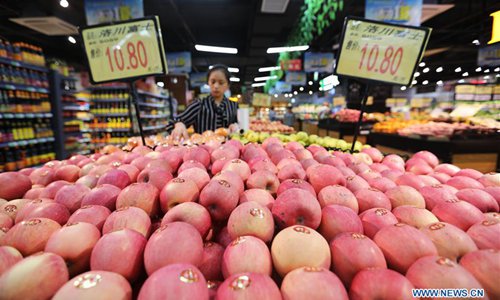
A customer selects fruits at a supermarket in Chishui City, southwest China's Guizhou Province, June 12, 2019. China's consumer price index (CPI), a main gauge of inflation, rose 2.7 percent year on year in May, quickening from the 2.5-percent growth for April, the National Bureau of Statistics (NBS) said Wednesday. (Xinhua/Wang Changyu)
China's Consumer Price Index (CPI), a main gauge of inflation, soared to 5.4 percent year-on-year in January, the highest level since November 2011 and surpassing analysts' expectations.The National Bureau of Statistics (NBS) attributed the CPI rise, which was a big jump from December's 4.5 percent growth, to a mix of factors including the Spring Festival holidays, the unexpected outbreak of the coronavirus epidemic and year-earlier base effects.
The gains were again fueled by a surge in food prices. In January, pork prices rose by 116 percent year-on-year, contributing to a 2.76 percentage point increase in the CPI and up from December's 97 percent growth.
Prices of beef, poultry, lamb and duck also rose by between 10.4 percent and 20.2 percent year-on-year in January, the NBS data showed.
In total, food prices jumped 20.6 percent year-on-year, contributing to a 4.1 percentage point increase in the CPI. Non-food prices rose 1.6 percent year-on-year in January.
Central China's Hubei Province, the epicenter of the epidemic, saw its CPI grow 5.5 percent in January. The rise was largely in line with national CPI growth and reflected Hubei's efforts to stabilize consumer prices, said Dong Lijuan, a senior statistician of the NBS.
Experts say the epidemic has pushed up consumer prices in the short term due to supply shortages.
"The virus-triggered city lockdowns and other disease-prevention efforts have halted manufacturing and logistics, leading to supply shortages and pushing up consumer prices in the short term," Tang Jianwei, a senior macroeconomic analyst at the Bank of Communications, told the Global Times.
But he said that in the long term, the epidemic will weigh on consumer prices by suppressing consumption demand.
"The domestic inflation rise is likely to edge down from the second quarter," he said.
The Producer Price Index (PPI), which measures the cost of goods at the factory gate, rose by 0.1 percent year-on-year in January, up from a 0.5 percent decline the previous month.
